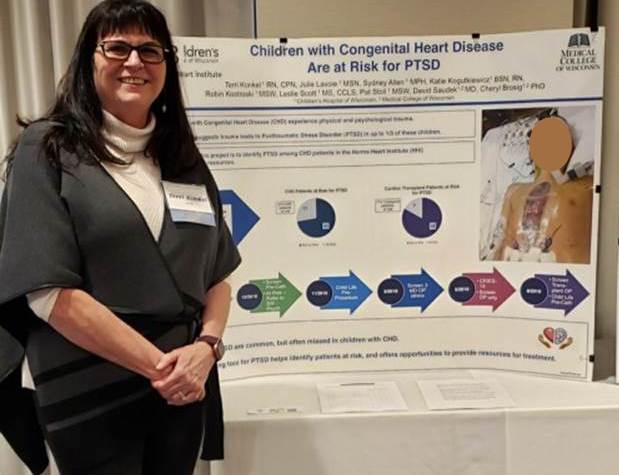
In one published article, up to 31% of children who undergo cardiac surgery develop post-traumatic stress disorder (PTSD)1. As if that weren’t difficult enough, the stress is compounded for many heart patients as they often have to undergo future procedures in the cath lab or operating room.
The article’s stats inspired one Herma Heart Institute nurse, Terri Konkel, RN, to create a protocol to identify and support patients who experience PTSD symptoms. “I have seen kids throughout my career who face extreme stress and anxiety from their congenital heart disease diagnosis,” said Terri. “I’m not aware of any center that has been able to implement a comprehensive approach to proactively identify these kids.”
With her project supported by internal funding programs, including the Innovation Fund, Terri teamed up with Herma Heart Institute staff from psychology, cath lab, social work and the Children’s Wisconsin Child Life and Expressive Therapies program to implement a screener that could identify signs of PTSD within a patient’s normal clinic appointment2.
Terri identified an existing PTSD screener — the Children’s Revised Impact of Events Scale, or CRIES-13 — that she thought could be utilized in a clinic setting. In her research, Terri had found that the CRIES-13 was considered to be a reliable and user-friendly tool to identify children who may have post-traumatic stress disorder. To test out the tool, she partnered with five cardiologists to use in clinic appointments.
In the two years of using the screener, 15% of patients screened “at-risk” for PTSD. These patients were invited to meet with Herma Heart Institute social workers who would review the results, coordinate mental health resources and discuss options for treatment. In some cases when the family agreed, the social workers also placed a referral to meet with the Herma Heart Institute psychology team, or a more local psychologist if the family was from out of town.
The benefit for patients who were screened, referred for mental health services, and received treatment was staggering. Terri recalled one patient, a teenage boy, who had been extremely anxious in advance of a cardiac catheterization. “His body triggered a fight or flight response that caused him to run and hide from staff in the pre-operative waiting area.”
Following the incident, the boy started a treatment plan that included cognitive-behavioral therapy, child life support and medication. The plan helped him develop coping skills to manage his anxiety. While he still requires a cardiac catheterization every year, he now comes to his procedures with healthy, adaptive coping skills.
There is still much work to be done in the area of PTSD and pediatric heart surgery — exploring other screening tools, expanding to other physician clinics and specialties — but Terri is proud of the accomplishments the team has made to date. “In the area of congenital heart disease, in the last few decades we have made huge progress in ensuring these babies survive into adulthood ,” said Terri. “We are just beginning to uncover all the ways we can ensure these kids thrive.”
1 Meentken MG, van Beynum IM, Legerstee JS, Helbing WA, Utens EM. Medically Related Post-traumatic Stress in Children and Adolescents with Congenital Heart Defects. Front Pediatr. 2017 Feb 13;5:20. doi: 10.3389/fped.2017.00020. PMID: 28243582; PMCID: PMC5303720.
2 Team members include Jenny Andres, MBA, MSN; Cheryl Brosig, PhD; Katie Kogutkiewicz, RN, BSN; Robin Kostroski, MSW; Leslie Scott, MS; Patricia Stoll, MSW; David Saudek, MD; Julie Lavoie, PhD, MSN



